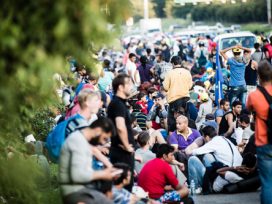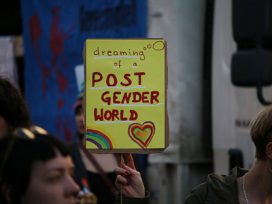History is replete with examples of how the political logic of disintegration sets in. But is the European Union next in line? You can be sure that it is, writes Ivan Krastev, so long as the European project remains a haven for elites over which people have no control.
Articles
Read more than 6000 articles in 35 languages from over 90 cultural journals and associates.

Freedom of movement was one of the major achievements of the revolutions of 1989, argues Jacques Rupnik. Now, central and eastern European heads of state refuse to grant this freedom to non-Europeans. But how much longer can they expect to maintain their contrary stance?

Fighting the wrong battle
A crisis of liberal democracy, not migration
The hostile response of central and eastern European heads of state to the prospect of accepting Syrian refugees is emblematic of the parlous state of liberal democracy in the region, say Michal Simecka and Benjamin Tallis. Europe must avert a deepening East-West divide.
Synthetic dreams
Gender, modernity and art silk stockings
The world’s first synthetic fabric, rayon, was spun into artificial silk stockings and worn by the same women who mass produced it. Hannah Proctor uses this as a guiding metaphor for her analysis of interwar gender politics and their relation to today.
A form of play
Or, the devotion of the tennis fan
British imperialists may have invented the modern idea of organized sport, associating valour on the field with virtues such as ‘fair play’, being a ‘good loser’ and, above all, nationalism. But, writes Elizabeth Wilson, the devotion of the tennis fan is of an altogether different quality.

Work-life balance, or success?
A conversation with the economist Alison Wolf
The extent to which working women are now creating a new society is unprecedented in human history, says Alison Wolf. And yet, the uncomfortable truth remains that everyone tends to take care only of his or her own social group.

Pirate libraries
A central and eastern European perspective
Many of today’s pirate libraries were born to address political, economic and social issues specific to Soviet and post-Soviet times, observes Bodó Balázs. They are now at the centre of a global debate on access to knowledge.

It is no longer possible to contrast a “secular” West with a “religious” East, writes Olivier Roy. Secularization and the de-culturation of religion are taking place in both East and West. The difference is the political forms that the de-culturated religions take.
It may well be that the Euro-Summit agreement of 12 July 2015 is forced through in a process at least as brutal, and even more divisive, than the extremities of the eurocrisis seen over the last five years. But even this does not necessarily preclude the renewal of European politics.
In her contribution to the editorial in Soundings’ summer issue, Syriza member Marina Prentoulis assesses the options for grassroots movements in a European Union that has lost sight of any notion of a “Social Europe”; a union determined to preserve a neoliberal agenda. The following was written prior to the 12 July Euro-Summit agreement.
The people versus the elite
The case of Spain
There are many words that neoliberalism has emptied of content – democracy, social justice, citizenship, sovereignty – that can be reclaimed, filled with progressive ideas and used to drive change. So says Sirio Canos Donnay, an archaeologist and member of Podemos.

The new "industrial revolution"
A conversation with Adrian Wooldridge
The ongoing revolution in knowledge and service economies is every bit as dramatic as the revolution in the industrial economy during the nineteenth century, says Adrian Wooldridge. And it is displacing or disorientating workers in the same way too, but probably at an even faster rate.
Who is to blame for the current chaos in the Middle East?
A conversation with Jean-Pierre Filiu
The hope of the Arab Spring, as pro-democracy revolutions swept the Middle East, is now a distant memory, as Yemen, Syria and Egypt remain mired in chaos and conflict (to varying degrees). But where did it all go so wrong? In his new book, From Deep State to Islamic State: The Arab Counter-Revolution and its Jihadi Legacy, Jean-Pierre Filiu examines the destructive role of Arab dictators in funding and arming hardline Islamists – boosting groups such as Islamic State (IS) – with a view to dividing the opposition and convincing western powers to back their dictatorships. Here, he discusses his arguments with New Humanist editor Samira Shackle.

Protest by proxy
New forms of power, new modes of resistance
Earlier this year, a hologram protest against Spain’s new “gag law” was staged in Madrid. A proxy protest fit for the age of proxy politics? Boaz Levin and Vera Tollmann weigh up the options now that power increasingly enjoys a prerogative to obscurity, while political subjects are rendered increasingly transparent.

After "emancipation after emancipation"
On Europe's anti-gender movements
As anti-gender movements gain momentum throughout Europe, using the concept of gender as a technical category may, in the long run, prove more self-destructive than useful. Andrea Peto argues for the re-enchantment of feminist politics.